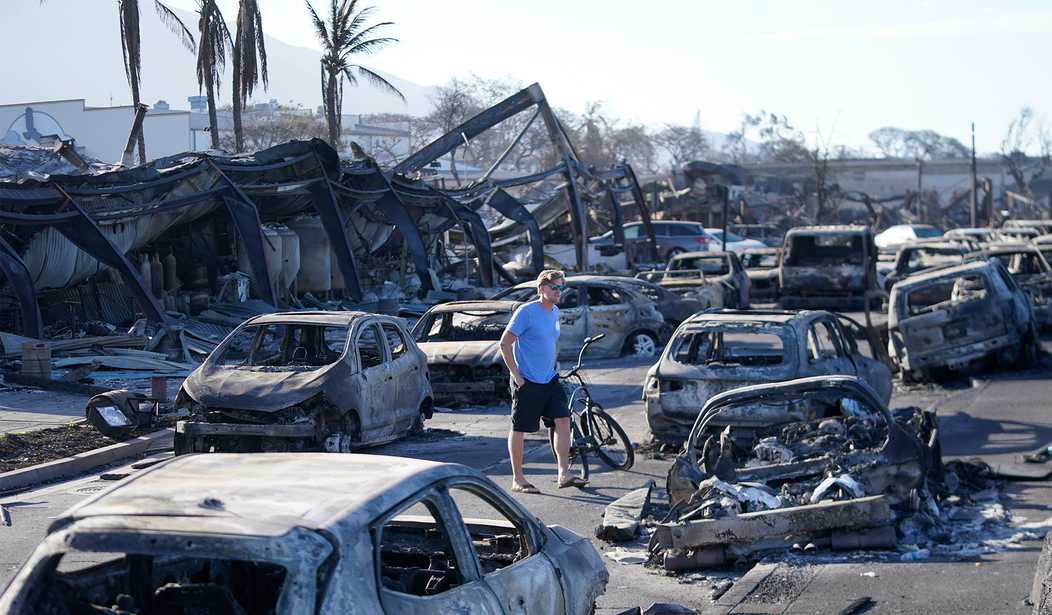It’s official: the Hawaii wildfires are one of the deadliest in American history. At least 92 people died during the disaster, with another 1,000 missing. Entire towns and communities have been wiped out. The cause of the fire is yet to be determined, but the dry, windy conditions due to a hurricane system off the coast, coupled with potential sparks from power lines, might have led to these tragic results. Even more disturbing is that residents of Maui, the location of the fire, said the emergency warning system was never activated (via NBC News):
As Tuesday's high winds stoked brush fires on the Hawaiian island of Maui into fast-moving wildfires that set off a frantic race to safety, no outdoor warning sirens were triggered by local or state emergency agencies.
"Neither Maui nor HI-EMA activated warning sirens on Maui during the wildfire incident," Hawaii Emergency Services Administration said Friday.
Instead, residents had to rely on three other forms of emergency warnings: alerts sent to mobile devices, to local radio and television stations and via Maui County's opt-in resident notification system.
"The sirens are used to alert the public to seek additional information; they do not necessarily indicate an evacuation," emergency officials said.
Scrutiny is mounting over whether enough warning was provided, even as the winds from Hurricane Dora, which has been churning over the central Pacific Ocean, knocked down power lines and disrupted cellphone communication.
[…]
"They didn't give us no warning. No nothing," Lisa Panis, a resident of the historic seaside community of Lahaina in western Maui, said in a phone interview. "No siren, no alarms, no nothing."
It was also reported that Hawaiian Electric did not have protocols to cut power lines during dangerous winds (via WaPo):
Four days before fast-moving brush fires engulfed parts of Maui, weather forecasters warned authorities that powerful wind gusts would trigger dangerous fire conditions across much of the island and Hawaii.
The state’s electric utility responded with some preemptive steps but did not use what is widely regarded as the most aggressive but effective safety measure: shutting down the power.
Hawaiian Electric, the utility that oversees Maui Electric and provides service to 95 percent of the state’s residents, did not deploy what’s known as a “public power shutoff plan,” which involves intentionally cutting off electricity to areas where big wind events could spark fires. A number of states, including California, have increasingly adopted this safety strategy after what were then the nation’s most destructive and deadliest modern fires, in 2017 and 2018.
Hawaiian Electric was aware that a power shut-off was an effective strategy, documents show, but had not adopted it as part of its fire mitigation plans, according to the company and two former power and energy officials interviewed by The Washington Post. Nor, in the face of predicted dangerous winds, did it act on its own, utility officials said, fearing uncertain consequences.
Recommended
These are matters that must be investigated in due time. For now, it’s about delivering aid to the resident of Maui, and reportedly, there’s not much of it right now, but that’s bound to change (via NYT):
Days after the deadliest American wildfire in more than a century ignited in West Maui, killing dozens and leveling more than 2,200 buildings, increasingly frustrated residents said that they were receiving far more help from an ad hoc network of volunteers than they were from the government.
After the fire destroyed the town of Lahaina, hundreds of local residents — a group that includes evacuees along with nearby residents who found themselves cut off from power and internet service — remained affected in West Maui, miles beyond the highway checkpoints. Some evacuees slept in parks; others stayed in their own homes that survived the disaster or with friends in the wider community of that part of the island.
They have been searching desperately for gasoline, phone reception and hot food, especially after power outages rendered refrigerators and microwaves useless. In many cases, they have leaned on church groups, community organizations and volunteers to track down missing relatives, get rides to shelters or access supplies brought in on private boats and airplanes.
“Where are the county officials? Nobody has internet — I just found out you can’t drink the water,” said Josh Masslon, who was sitting on a hill by the remote Kapalua Airport on Friday night trying to get cellphone service. “The communication has been nil.”
The death toll from the fire continued to rise — to at least 93 on Saturday — with more expected. While life in most other parts of Maui seems to have continued with little interruption, West Maui has felt like an island unto itself.
Residents and evacuees have been particularly desperate for gasoline to fuel their vehicles and run generators. They also have welcomed the home-cooked meals coming from sympathetic residents elsewhere in Maui, the rice dishes and the cans of Spam that are island favorites. Too little of it has been coming from government agencies, West Maui residents bemoaned.
Prayers up for Hawaii.

























Join the conversation as a VIP Member